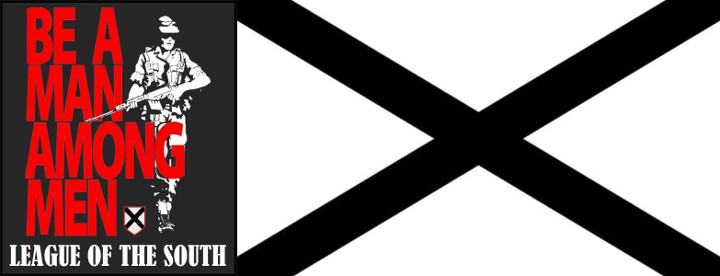What is a Church? with Dr. Michael Hill

What is a “church”?
If you are a nationalist, what should you think about “church”? If you recognize that the world is corrupt, and all of the Christian churches of any denomination are guilty of magnifying, perpetuating, or enabling the corruption, how could you take part in any such church? As either a Christian or a nationalist, how could you contribute to the corruption? If you attend these churches, how could you not be guilty of the sins which they have come to accept?
The Roman Catholic Church might take a public stance against Sodomy, but for centuries it has turned a blind eye to the Sodomy and pedophilia which have been practiced by its own priests. The Orthodox Church is not free of this dilemma, as its priests have also frequently been caught in the same behavior, not only in America but in Europe and elsewhere. The Protestant churches all have these same problems and perhaps to a greater degree. There are records of cases which can be found on the Internet, many sourced from the church organizations themselves, showing that the corruption of Sodomy, pedophilia, adultery and other types of sexual transgression is just as prevalent in these churches as it is in the secular world. For example, churches belonging to the Southern Baptist Convention have suffered 700 documented cases of child sexual abuse in 20 years, as reported this past February by the Houston Chronicle.
Those who commit or who overlook such sins cannot possibly continue to stand against sin. According to the words of Paul of Tarsus in Romans chapter 1, those who accept such sinners are just as guilty of the sins committed by the sinners as the sinners themselves, and he was speaking specifically in reference to Sodomy. While in 2012 the Southern Baptist Convention took a firm stance against Sodomy, it nevertheless resolved to take a “stand against any form of gay-bashing, whether disrespectful attitudes, hateful rhetoric, or hate-incited actions toward persons who engage in acts of homosexuality”, a vague position which could be construed as discouraging, or even condemning any admonishment of Sodomites. Then, by 2014 the Convention was officially neglecting to condemn “gay-tolerant” churches, even church pastors who had begun to proclaim that Sodomy is not a sin, when it certainly is.
If you are a member of one of these church organizations, you might deny that these things are happening in your particular church, but with all certainty that church is a member of an association of churches with members that are plagued with such problems. And although all men sin and fall short of the glory of God, now practically all of these same church associations have embraced these sinners, even giving pastoral positions to open sodomites and lesbians. These church associations are in turn able to enforce their directives in local churches by threatening to disfellowship them, just as the government is able to enforce its policies in local churches by threatening to revoke tax exempt-status to churches not in compliance. Suffering either of these things can very much hurt the local church economically, the way that church economy has come to rely on government and these centralized organizations. In Protestant churches, the associations have nearly the same centralized power over local churches that was once exercised by medieval popes. Local church pastors must therefore adhere to the wishes of the wider association, even in spite of their own opinions of right and wrong.
But aside from the moral corruption which is found in the churches, compounded is the dilemma of the nationalist. The same 2012 Southern Baptist Convention also announced that “All people, regardless of race or sexual orientation, are created in the image of God and thus are due respect and love”. Earlier, in 1995, the Convention had renounced racism, abandoning a 150-year policy of encouraging segregation. The same attitudes are expressed often in the literature of all church organizations, where is has become practically impossible for any nationalist to justify his positions on the preservation of his own race and Nation through ethnic separation, while also barring the door to any position against race-mixing. The Southern Baptist Convention condemned the alt-Right months before Charlottesville, and the alt-Right is actually quite soft on many racial and moral issues. Less than 50 years ago, the Southern Baptist Convention had a strong position against race-mixing, understanding that it was a sin. Now we see the same erosion of Christian principles in regard to Sodomy.
In 1948, Roman Catholic churches were instrumental in getting California’s anti-miscegenation laws struck down. In 1967, in a Supreme Court case known as Loving vs. Virginia, Roman Catholic churches, agencies and bishops filed a friend-of-the-court brief encouraging the court to strike down laws prohibiting interracial marriage in nearly a dozen state across the South. Likewise, the official position of the Russian Orthodox Church is a denunciation of “nationalism, xenophobia and national exclusiveness” while Orthodox clergy in America have issued a statement declaring racism to be a sin. All of these declarations abuse Biblical passages to support their positions.
So even if your church is free of the taint of Sodomy or pedophilia, and even if it is an all-White congregation, what would happen the first time a Negro or someone of another race walked through the door and took a seat? And if he is permitted, what would happen when he asks your daughter for a date once the service ends? Could you even be a Nationalist and still imagine unification with other races in the Kingdom of Heaven? If you do, then what is the moral basis for your nationalism here in this world? After all, Paul of Tarsus said there is “neither Jew nor Greek” (Galatians 3:28, Colossians 3:11), and that there is only “one body in Christ, and every one members one of another” (Romans 12:5).
But while your churches will not teach this, the truth is that those verses are taken out of their original historical and Biblical context in order to uphold the political objectives of the modern-day empire. In the New Testament, the apostle Jude informs us that fornication is the “going after of strange flesh”, which is in modern English the pursuit of different flesh, which his race-mixing. So in 1 Corinthians chapter 10 Paul used the same word in regard to an incident in the Old Testament where the men of Israel had joined themselves to the daughters of Moab, in Numbers chapter 25. Paul then warned the Corinthians not to commit fornication as they had done, which is certainly a warning not to engage in that same sort of race-mixing. In Revelation chapter 2, we read that Jesus will kill the children of such fornicators. So why should we as Christians endanger any of our own progeny in this manner?
There is much more in Scripture than this, but it is absolutely evident that Scripture does provide a moral foundation for nationalism, and it is indeed the only proper moral foundation for nationalism, as it was among our ancestors for many generations until recent times. Even if we believe the childish interpretation of Acts 17:26, where it says that God had “made of one blood all nations of men for to dwell on all the face of the earth”, the churches fall short of repeating the rest of the statement, where it says that God had “determined the times before appointed, and the bounds of their habitation.” Later, in the Revelation, it is explained that Satan would gather all nations against the Camp of the Saints. So where we see the mixing of all nations, that is not the work of God, even if He knew it would happen. Instead, it is the work of Satan, and the churches are deceived into supporting it.
The whole Bible rests on the continually repeated statement in Genesis that the Creation of God was made “kind after kind”, and Nationalism is the political and social expression of the desire to maintain one’s own kind relative to that commandment, which is an expression of love for God’s creation. The Hebrew word translated as neighbor, which appears in Leviticus chapter 19 where it first says to “love thy neighbor”, is related to terms describing pasture and a flock which has been raised together. A wolf cannot be a neighbor simply because it moves in among the sheep, so the term is not a geographical expression. The Scripture commands Christians to “come out from among them, and be ye separate, saith the Lord, and touch not the unclean; and I will receive you”. So White Christians have a responsibility to separate themselves from sinners, and also from the non-White races, lest they be liable for any resulting fornication.
Two thousand years ago, men and women turning to Christianity separated themselves from the wider Roman society so that they could separate themselves from the decadence which had permeated it. Paul wrote about some of that decadence in Romans chapter 1, how they were degrading themselves with Sodomy, and the historian Tacitus, writing of that same time, corroborates the attitudes among Romans which had supplied the reasons for Paul’s admonitions. Titus Livius, or Livy, another and more prolific Roman historian, also described the slide of Rome into immorality and decadence in the decades before the time of Christ.
There were no church buildings in those days, and neither were there any so-called “Christian priests”. Throughout three hundred years of early Christian writings, there is no mention of either. Christians, often also being persecuted for their rejection of the decadent society and its inherent idolatry, were compelled to have their gatherings at home. For that, Tacitus has called them “anti-social”. Since it was unlawful for large numbers of people to gather privately, those home churches were often limited to family members and perhaps extended families, or just a small number of friends. Even this was risky, because in the first century and for different reasons, Caesar Augustus had banned “all private associations as potentially subversive”. As it is evident in the Book of Acts (16:21), the Roman government controlled the religion of its citizens, and private assembly in any significant numbers was virtually prohibited. Nevertheless, this was how Christianity survived for three hundred years.
The Greek word ἐκκλησία is translated as church in most modern Bibles, but this is not the meaning of the word. It actually means assembly, and in early Bibles, such as William Tyndale’s New Testament, the Latin word ecclesiam, which is the equivalent of ἐκκλησία, was more appropriately translated as congregation. The word describes the assembly of the people, and not any building or organization, although the later Churches replaced it with the word church for their own purposes.
This situation and others has caused much confusion among Christians as to the proper mode of worship and how they should assemble for worship. The organized churches have taken advantage of words that they themselves have purposely mistranslated so that they may pretend to have a legitimate monopoly on the consciences and souls of men. All of this began in the 4th century, when after Constantine the Great had signed the Edict of Toleration, so-called “Christian priests” began to emerge, and the formerly pagan priests had begun to influence a newly emerging form of Christianity which was then acceptable to the empire. By the time Rome had made Christianity its official religion, these new “Christian priests” were in a position to take over Christianity for themselves, and the formerly pagan empire was fully comfortable with its own formerly pagan priesthood in control of its new creed. Constantine himself had begun this process when he began to insist that Church councils be assembled to enforce the conformance of all Christian assemblies within the empire to a particular set of standards, some which were good and some not so good.
So organized Christianity was never true Christianity, and it was never the Christianity of the apostles. The apostles would have despised the organization of rituals into sacraments, many of which were actually pagan in origin, or the appointment of priests and popes. The Christian assemblies Paul of Tarsus had left behind chose their own supervisors, or bishops, and servants, or ministers, and were completely autonomous from all other assemblies or congregations. Paul himself had told the Corinthians, in his second epistle to them in chapter 1, “24 Not for that we have dominion over your faith, but are helpers of your joy: for by faith ye stand.” Paul encouraged his students to read the Scripture, because in the Scripture is the substance and regulation of the Faith, which is the example of the Bereans as it is described in Acts chapter 17.
Now that White Christians are completely under siege in their own lands, and the organized churches have been entirely corrupted, it is time for nationalists everywhere to abandon those churches, and return to that model of Christian fellowship which those earliest Christians have left to us. Nationalists, and particularly in our case, members of the League of the South, should form their own Bible Study groups and fellowships out of their own local organizations. The League is not a Church, but members should find their churches within the League, and stop supporting the churches of the world which are against them and contrary to their very survival as a people.
Some afterthoughts expressed during the podcast presentation:
 Nationalists are being disfellowshipped by churches, but it is past time that Nationalists should be disfellowshipping the churches, as they are all corrupt. They should be forming their own churches with their fellow nationalists. This attitude should surely not be limited to the League of the South, but nationalists everywhere should be doing this. Churches are nothing more than local congregations, and may only be a home study group, but can grow beyond that stage. Eventually, men capable of being pastors will be recognized by each individual congregation, which is how pastors were selected in the early centuries of Christianity.
Nationalists are being disfellowshipped by churches, but it is past time that Nationalists should be disfellowshipping the churches, as they are all corrupt. They should be forming their own churches with their fellow nationalists. This attitude should surely not be limited to the League of the South, but nationalists everywhere should be doing this. Churches are nothing more than local congregations, and may only be a home study group, but can grow beyond that stage. Eventually, men capable of being pastors will be recognized by each individual congregation, which is how pastors were selected in the early centuries of Christianity.
League of the South members should be forming home study groups with their fellow members. There are already a few such groups like this within the League. Tithes should be directed to the League and its members, those who are needy. Tithes do not have to be in money, but can be in time or in services. Tithes given to churches most often end up benefiting non-Whites and advancing causes which nationalists should abhor. Nationalists doing this, or even simply attending worldly churches, are forever going to be double-minded, and a double-minded man is unstable in all his ways. You cannot be a true nationalist on Saturday if you are a denominational church-goer on Sunday, as the two are contrary to one another.
Doing this, one replicates the original Christianity of the apostolic age, which was centered on the faithful within each local community and study of the Scriptures. That is a church.






 Please click here for our mailing list sign-up page.
Please click here for our mailing list sign-up page.







